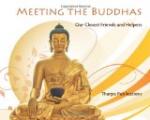Some are singing; not so long a song as they sing in the summer, but just a kind of gay humming; while others are dashing about, chasing one another through the woods in sport.
But the robin is a great home-lover. At the very first sign of spring he begins to think about returning to us, and some warm day, late in February, we may generally find him hunting for food about the grassy banks of a spring, or on the sheltered side of a wood.
Soon, if the weather continues pleasant, we shall hear him sing. What a welcome sound it is! How it recalls memories of cherries and strawberries, and of all the good things of summer!
In the latter hall of April he and his mate go to housekeeping. Who hasn’t seen a robin’s nest?—that strong, large house of grasses, plastered inside with mud, and furnished with a lining of rootlets.
He places it almost anywhere in the trees, but generally in a broad crotch. If you are fortunate, and the robin has learned that you are his friend, he may build his mud and grass cabin in a tree near your window.
Then you can learn all about his household affairs. You will see the four blue eggs. You will know how many days it takes them to hatch, and you will see what faithful parents birds are.
Not only will they give every minute of their time to securing food for their hungry family, but they will bravely fight any enemy who appears. If it rains, you may see the mother bird standing on the nest with wings spread over her young, to shelter them from the falling drops.
Generally the robin rears two families each season. When the first brood is ready to leave the nest, Father Robin takes charge of them. Every night he leads them to a great roost or nursery where other young robins are brought by their fathers to sleep. In the daytime he returns to help Mother Robin care for family number two.
At last all the young are old enough to care for themselves. Then they gather in large flocks and go for a holiday in the wild cherry trees. When the cherries are gone, they visit the sassafras and pepperidge trees, and the woodbine tangles. Then comes a course of dogwood, with a dessert of nanny-berries.
Cedar berries are added by way of a bit of cracker and cheese. Then the robin’s great feast is over, and he leaves us for the repast which is awaiting him in the South.
The robin is very useful to the farmer. He eats ants, bugs, caterpillars, army worms, and many other worms and insects which would harm the grass and fruit trees.
In return, what does he ask? Only to dine on a few ripe cherries and strawberries.
ROBIN REJOICE.
Among the first of the spring,
The notes of the Robin ring;
With flute-like voice,
He calls, “Rejoice,
For I am coming to sing!”
To any one gloomy or sad,
He says, “Be glad! be glad!
Look on the bright side,
’Tis aye the right side;
The world is good, not bad.”




